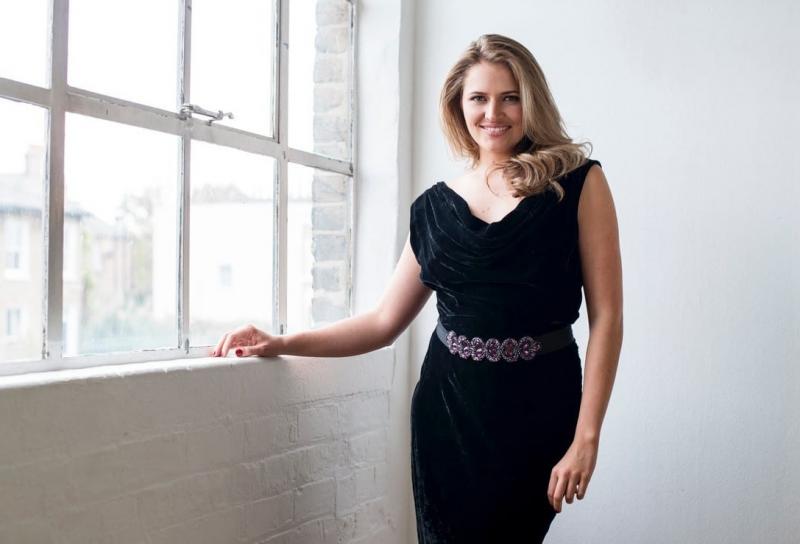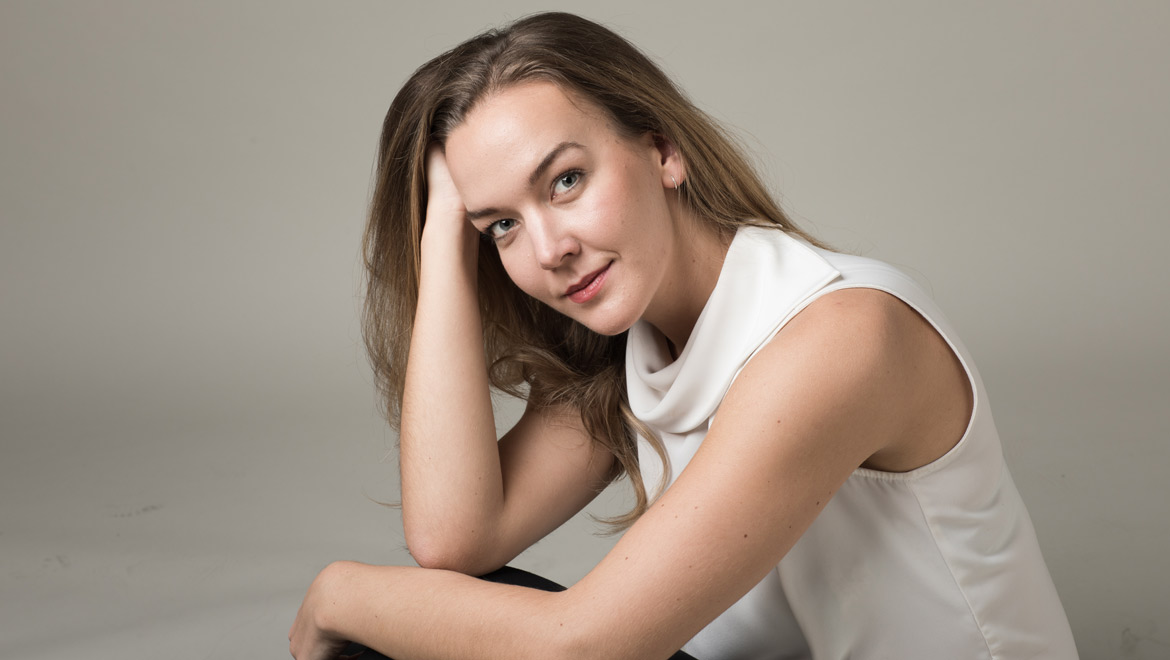Clarke, Ränzlöv, The Mozartists, Page, Wigmore Hall - young Mozart among the giants | reviews, news & interviews
Clarke, Ränzlöv, The Mozartists, Page, Wigmore Hall - young Mozart among the giants
Clarke, Ränzlöv, The Mozartists, Page, Wigmore Hall - young Mozart among the giants
1770 is this year's focus in 'Mozart 250,' showcasing two bright young singers

Assuming the world holds together that long, there will be something we can rely on annually all the way to 2041, the 250th anniversary of Mozart's death: among the celebrations each year, a Wigmore Hall concert like this one, placing Amadeus among the other composers of his time, great and small(er).
Last night it was the turn of soprano Samantha Clarke, not long graduated from the Guildhall School, taking its 2019 gold medal, and flagged up here as a promising newcomer in our "Best of Year" column for 2018, alongside mezzo Ida Ränzlöv (pictured below by Benjamin Ealovega), already a member of Stuttgart Opera. Some thought Ränzlöv a bit cool, though the way lustrous, impassioned mezzo tone gradually emerged from what initially sounded like a lighter, sopranoid voice in classic Gluck arias from Paride ed Elena (Paris and Helen) simply suggested that she is taking time to emerge in full stage confidence.
Which Clarke already has in spades: living the text, relishing the humour of arias from what could be stock minxes in Haydn operas - the teasing Grilletta in Haydn's Lo speziale (The Apothecary), the metre-slipping commoner Lesbina playing an aristocrat in Le pescatrici - and sensitive to her colleagues, above all to the horn obbligato of Gavin Edwards, a total star of a Mozartists concert last year, in "Lungi da te" from the opera with which the 14-year old Mozart finally arrived in 1770, Mitridate, re di Ponto; their short cadenza together was a delicious highlight of a totally pleasurable evening.  So 1770 it was in the Mozart 250 project's sixth year. The symphonies placed alongside the arias and duets were especially fascinating last night: an agitated E minor specimen, one of a hundred by Bohemian Johann Baptist Vanhal and a fully acid, lean and hungry Sturm und Drang mini-masterpiece by Johann Christian Bach (Op. 6 No. 6 in G minor). Vanhal's Minuet was strikingly plaintive, its contrasting trio beautifully capped by James Eastaway's luminous oboe tone; Bach surprises us by sticking to a minor key even in his Andante (più tosto adagio), while frills and sighs were quickly dispelled by the Mozartists' vivid bite in the outer movements. Nuances in dynamics and phrasing were outstanding, as always under Page. The encyclopedic knowledge of the period in his programme notes, which make every concert booklet collectable, gave us a special nugget here: Vanhal, Haydn and Mozart played string quartets with Mozart (and Dittersdorf) for a gathering in the mid-1780s.
So 1770 it was in the Mozart 250 project's sixth year. The symphonies placed alongside the arias and duets were especially fascinating last night: an agitated E minor specimen, one of a hundred by Bohemian Johann Baptist Vanhal and a fully acid, lean and hungry Sturm und Drang mini-masterpiece by Johann Christian Bach (Op. 6 No. 6 in G minor). Vanhal's Minuet was strikingly plaintive, its contrasting trio beautifully capped by James Eastaway's luminous oboe tone; Bach surprises us by sticking to a minor key even in his Andante (più tosto adagio), while frills and sighs were quickly dispelled by the Mozartists' vivid bite in the outer movements. Nuances in dynamics and phrasing were outstanding, as always under Page. The encyclopedic knowledge of the period in his programme notes, which make every concert booklet collectable, gave us a special nugget here: Vanhal, Haydn and Mozart played string quartets with Mozart (and Dittersdorf) for a gathering in the mid-1780s.
Duets ended each half: not perhaps J C Bach's or Mozart's best, but the final flourish of "Se viver non deggio", another taster for the full Mitridate to be performed later this year, really did crown the evening. It starts with identical lines traced by each soloist, which with Ränzlöv in full flight allowed the best contrast between her lustrous mezzo and Clarke's ideal lyric soprano, and fleshes out textures with the orchestral stars of the evening, the horns and the oboes. Pleasures assured, then, not just for the entire opera but for a weekend of Cadogan Hall concerts in March during which Clarke, confirmed now as the complete artist in 2020, will be reappearing.
rating
Explore topics
Share this article
The future of Arts Journalism
You can stop theartsdesk.com closing!
We urgently need financing to survive. Our fundraising drive has thus far raised £49,000 but we need to reach £100,000 or we will be forced to close. Please contribute here: https://gofund.me/c3f6033d
And if you can forward this information to anyone who might assist, we’d be grateful.

Subscribe to theartsdesk.com
Thank you for continuing to read our work on theartsdesk.com. For unlimited access to every article in its entirety, including our archive of more than 15,000 pieces, we're asking for £5 per month or £40 per year. We feel it's a very good deal, and hope you do too.
To take a subscription now simply click here.
And if you're looking for that extra gift for a friend or family member, why not treat them to a theartsdesk.com gift subscription?
more Classical music
 Robin Holloway: Music's Odyssey review - lessons in composition
Broad and idiosyncratic survey of classical music is insightful but slightly indigestible
Robin Holloway: Music's Odyssey review - lessons in composition
Broad and idiosyncratic survey of classical music is insightful but slightly indigestible
 Classical CDs: Wolf-pelts, clowns and social realism
British ballet scores, 19th century cello works and contemporary piano etudes
Classical CDs: Wolf-pelts, clowns and social realism
British ballet scores, 19th century cello works and contemporary piano etudes
 Bizet in 150th anniversary year: rich and rare French offerings from Palazzetto Bru Zane
Specialists in French romantic music unveil a treasure trove both live and on disc
Bizet in 150th anniversary year: rich and rare French offerings from Palazzetto Bru Zane
Specialists in French romantic music unveil a treasure trove both live and on disc
 Scottish Chamber Orchestra, Ibragimova, Queen’s Hall, Edinburgh review - rarities, novelties and drumrolls
A pity the SCO didn't pick a better showcase for a shining guest artist
Scottish Chamber Orchestra, Ibragimova, Queen’s Hall, Edinburgh review - rarities, novelties and drumrolls
A pity the SCO didn't pick a better showcase for a shining guest artist
 Kilsby, Parkes, Sinfonia of London, Wilson, Barbican review - string things zing and sing in expert hands
British masterpieces for strings plus other-worldly tenor and horn - and a muscular rarity
Kilsby, Parkes, Sinfonia of London, Wilson, Barbican review - string things zing and sing in expert hands
British masterpieces for strings plus other-worldly tenor and horn - and a muscular rarity
 From Historical to Hip-Hop, Classically Black Music Festival, Kings Place review - a cluster of impressive stars for the future
From quasi-Mozartian elegance to the gritty humour of a kitchen inspection
From Historical to Hip-Hop, Classically Black Music Festival, Kings Place review - a cluster of impressive stars for the future
From quasi-Mozartian elegance to the gritty humour of a kitchen inspection
 Shibe, LSO, Adès, Barbican review - gaudy and glorious new music alongside serene Sibelius
Adès’s passion makes persuasive case for the music he loves, both new and old
Shibe, LSO, Adès, Barbican review - gaudy and glorious new music alongside serene Sibelius
Adès’s passion makes persuasive case for the music he loves, both new and old
 Anja Mittermüller, Richard Fu, Wigmore Hall review - a glorious hall debut
The Austrian mezzo shines - at the age of 22
Anja Mittermüller, Richard Fu, Wigmore Hall review - a glorious hall debut
The Austrian mezzo shines - at the age of 22
 First Person: clarinettist Oliver Pashley on the new horizons of The Hermes Experiment's latest album
Compositions by members of this unusual quartet feature for the first time
First Person: clarinettist Oliver Pashley on the new horizons of The Hermes Experiment's latest album
Compositions by members of this unusual quartet feature for the first time
 Gesualdo Passione, Les Arts Florissants, Amala Dior Company, Barbican review - inspired collaboration excavates the music's humanity
At times it was like watching an anarchic religious procession
Gesualdo Passione, Les Arts Florissants, Amala Dior Company, Barbican review - inspired collaboration excavates the music's humanity
At times it was like watching an anarchic religious procession
 Classical CDs: Camels, concrete and cabaret
An influential American composer's 90th birthday box, plus British piano concertos and a father-and-son duo
Classical CDs: Camels, concrete and cabaret
An influential American composer's 90th birthday box, plus British piano concertos and a father-and-son duo
 Cockerham, Manchester Camerata, Sheen, Martin Harris Centre, Manchester review - re-enacting the dawn of modernism
Two UK premieres added to three miniatures from a seminal event of January 1914
Cockerham, Manchester Camerata, Sheen, Martin Harris Centre, Manchester review - re-enacting the dawn of modernism
Two UK premieres added to three miniatures from a seminal event of January 1914

Add comment